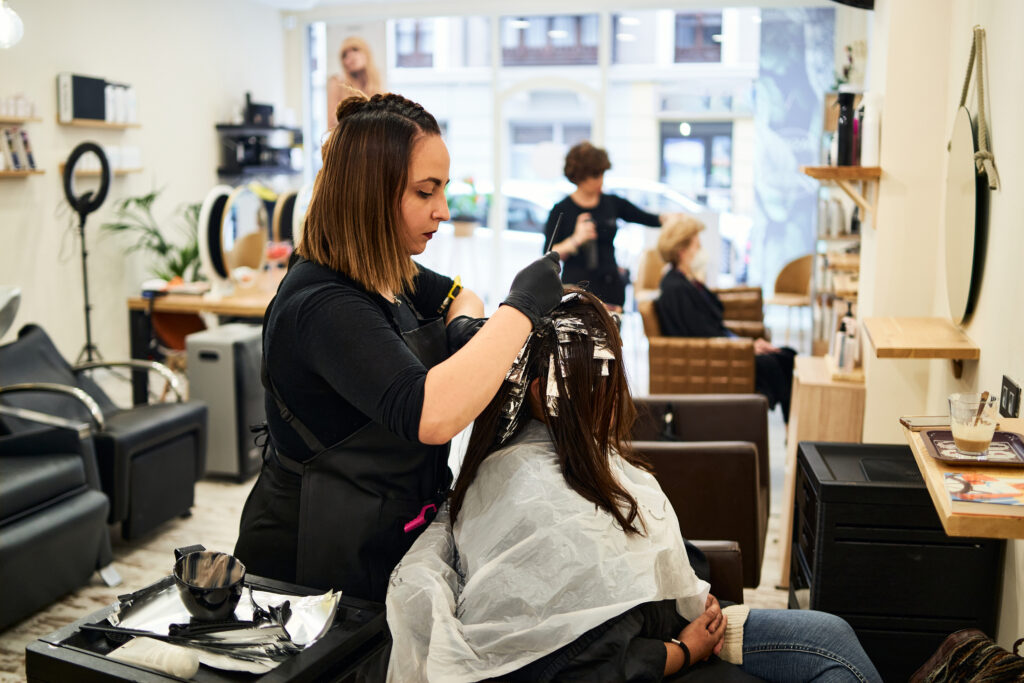
Can Hair Relaxers and Other Hair Products Increase Your Cancer Risk?
Many beauty professionals use hair relaxers, permanent hair dyes, and other hair products that contain strong chemicals. These products use different chemical components to change the structure and appearance of your hair. But can exposure to these chemicals impact your health?
Historically, studies on the link between hair products and cancer have been inconsistent, but in the past five years, researchers have focused on investigating the link between these products and breast, ovarian and uterine cancers. No recent studies have found definitive proof that hair relaxers or dyes do or do not cause cancer. However, there may be a link to frequent use of chemical hair relaxers and an increased risk for developing cancer.
“Research on cancer risk and prevention is constantly developing,” said medical oncologist Dr. Rosa Michel Ortega at Southern Cancer Center. “Understanding risk factors for developing cancer is an important part of helping people make informed lifestyle choices.”
Recent Studies Look at Link Between Hair Relaxers and Increased Cancer Risk
Several researchers have looked at recent data from women taking part in the Sister Study, an ongoing study started by the National Institute of Environmental Health Sciences in 2003, to look for risk factors for breast cancer and other women’s health conditions. Participants include more than 50,000 women across the US and Puerto Rico who complete health updates each year. Findings from this study include the following research:
- A 2020 study published in the International Journal of Cancer found women who used chemical hair straighteners more than six times a year had about a 30 percent higher risk of developing breast cancer as compared to women who did not chemically straighten their hair.
- A 2021 study published in Carcinogenesis found women who used chemical hair straighteners more than four times a year were twice as likely to develop ovarian cancer.
- A 2022 study in the Journal of the National Cancer Institute found women who used chemical hair straighteners more than four times a year were twice as likely to develop uterine cancer. This study did not find any links between uterine cancer and other chemical treatments, including dyes, highlights, and perms.
- According to a 2017 study published in Carcinogenesis, 88 percent of Black women have used chemical hair relaxers, potentially putting them at a higher risk of developing health issues associated with those products. Hairdressers may also be at a higher risk due to repeated exposure from working with certain chemicals.
It is important to note that while these studies have found a possible link to increased cancer risk, no study has concluded that these hair products cause cancer and further studies would be needed to confirm this link.
Many of the concerns around the cancer link between hair relaxers and cancers are due to these products commonly containing formaldehyde or formaldehyde releasing chemicals. Exposure to formaldehyde can cause immediate reactions like watery eyes, coughing, nausea, and skin irritation, and may also cause long-term health risks, including cancer. The Food and Drug Administration (FDA) has proposed a ban on the use of formaldehyde in hair-straightening and smoothing products, set to move forward in 2024.
Does Exposure to the Chemicals in Hair Dye Increase Cancer Risk?
Researchers have been studying potential links between the chemicals found in various types of hair dye and cancer risk. Recent studies have largely looked at links between the risk of blood cancer, bladder cancer, and breast cancer in people who use hair dye regularly and people who are exposed to hair dye chemicals regularly at work.
Studies of people who work with hair dyes have found a small increase in the risk of developing bladder cancer. A 2010 study found a statistically significant risk in particular for hairdressers working with these products for 10 or more years. There has been no link found between bladder cancer and people who have had their hair dyed.
The 2020 International Journal of Cancer study on chemical straightener and hair dye use also found a 45 percent higher breast cancer risk in Black women who used permanent hair dye and a 7 percent higher breast cancer risk in white women reporting permanent hair dye use. A separate 2020 study in the British Medical Journal found a higher risk of ovarian and some breast cancers for women who have dyed their hair 100 times or more.
Several studies have looked at a potential link between personal hair dye use and increased risk of blood cancers like leukemia or lymphoma, but these studies have had mixed results. Some studies show an increased risk of non-Hodgkin’s lymphoma in women who began hair dye use before 1980 and/or women who dye their hair with darker colors. Other studies have found no link to an increased risk.
While the US National Toxicology Program (NTP) has not classified hair dyes as causing cancer, it has classified some chemicals used in hair dyes as “reasonably anticipated to be human carcinogens.” The International Agency for Research on Cancer (IARC) has classified workplace exposure to hair dyes as “probably carcinogenic,” but does not consider personal hair dye use as a potential cause of cancer.
What Should I Consider When Choosing Hair Products?
While hair products are regulated by the FDA, they are not tested for safety. Consumers can ask their hairdresser about the ingredients in the products used on their hair. In addition to avoiding products with formaldehyde, consumers should also avoid its liquid forms, formalin and methylene glycol.
For people using at-home hair products, the FDA recommends following the directions on the package and paying attention to any “caution” or “warning” statements. Wear gloves when applying hair dye, and do not leave the dye on your scalp for longer than the directions say you should.
Talk to Your Healthcare Provider About Any Concerns
If you frequently use chemical straighteners or permanent hair dye and have concerns about how it may impact your health, speak to your doctor about your individual health risk factors. They can help you determine any proactive steps to take to maintain your health.
To learn more about risk factors for breast, ovarian and uterine cancers, visit the Cancer Types section on Southern Cancer Center’s website.

